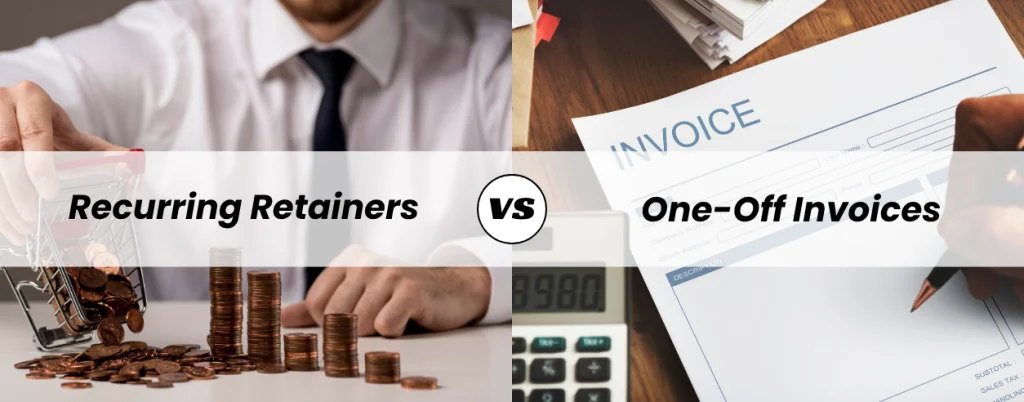Every business has its rhythm.
For some, it’s a steady pulse — clients who pay the same amount every month, the retainer model that hums like background music.For others, it’s jazz — bursts of big one-off invoices, long silences, and occasional applause when the wire finally lands.
Both earn revenue. But only one builds predictability — and for Indian exporters and service providers, predictability in INR realisation can make the difference between financial flow and financial fatigue.
Because while you might be exporting design, code, or consulting, what you really need to export is stability. And that’s where the way you charge — not just what you charge — begins to shape your landed INR.
Why Predictability Matters More Than Ever
If 2024 taught exporters anything, it’s that consistency beats volume.
A business with ten £1,000 retainers often feels more stable than one that lands a single £10,000 project every quarter.
In India’s export ecosystem, where cross-border method of payment in international trade can stretch over multiple intermediaries, predictable inflows are not just about revenue — they’re about working capital, tax compliance, and FX strategy.
When your USD or EUR income fluctuates wildly, so does your access to INR liquidity. That volatility affects:
- Cash flow planning
- GST refund timelines
- RBI export realisation periods
- FX conversion rates
- Even business valuation if you’re raising funds
Which means — even the most brilliant export business can look shaky if its payments are unpredictable.
Retainers vs One-Off Invoices: Two Very Different Journeys
| Aspect | Recurring Retainers | One-Off Invoices |
| Nature of Revenue | Steady, predictable recurring revenue | Irregular, project-based income |
| Client Relationship | Long-term partnership with ongoing value exchange | Transactional; handled on a project-by-project basis |
| FX & INR Predictability | Easier to hedge and plan INR inflow | Fluctuating conversion rates and unpredictable flow |
| Operational Effort | Single agreement with automated recurring billing | Requires new invoice and follow-up for each project |
| Export Compliance | Simplified FIRC tracking with consistent purpose code | Multiple FIRCs; frequent reconciliation needed |
| Working Capital | Smooth INR inflow enabling better expense planning | Sporadic liquidity; harder to forecast cash flow |
| Best Suited For | Service exporters, agencies, SaaS providers, consultants | High-value projects, creative gigs, manufacturing |
Both have their place. But when your export depends on cash consistency — recurring retainers offer the financial equivalent of oxygen: not flashy, but essential.
The Compliance Twist in Export Payments
In theory, both retainers and one-off payments look the same to your client — a USD or EUR amount sent your way.
In practice, the export invoice and its compliance trail behave very differently.
One-off export invoices:
Each invoice generates a separate FIRC and purpose code entry. Your bank (or fintech platform) treats them as distinct transactions, which means:
- Multiple e-FIRCs to store and reconcile
- Potential mismatches between invoice and payment
- More work for your accountant or CA during BRC generation
Recurring retainers:
Once your client agreement and purpose code are set, payments flow under the same classification. Fintech export platforms (like HiWiPay) match each incoming remittance automatically to its recurring invoice series.
That means:
- Auto-generated FIRCs
- Purpose-code consistency
- Export realisation tracking that actually makes sense
In short — recurring models reduce compliance friction while one-off invoices multiply it.
The INR Impact: When Frequency Meets FX
A ₹83.20 vs ₹82.70 USD-INR shift doesn’t seem dramatic — until you multiply it across multiple invoices.
Let’s say you invoice $2,000 per month as a retainer, versus $24,000 once a year.
| Model | Average USD–INR Rate (Over Period) | INR Realised | Variance vs Ideal (₹83.00) |
| Monthly Retainer | ₹83.10 (average) | ₹19,94,400 | +₹4,800 |
| Annual One-Off | ₹82.60 (on payment day) | ₹19,82,400 | –₹7,200 |
That’s a ₹12,000 swing just due to timing — not skill, not sales, not cost — pure FX timing risk.
The irony? Retainers shield you from market mood swings that one-off exporters keep absorbing.
Common Payment Routes and How They React
| Route | How It Handles Retainers | How It Handles One-Off Invoices | Predictability (1–5) |
|---|---|---|---|
| Bank SWIFT | Manual recurring wires or standing instructions; FX rate applied each time | New SWIFT every project; slower & fee-heavy | ★★☆☆☆ |
| Wise / Remittance Fintech | Scheduled transfers possible; not export-compliant | Quick transfers; lacks FIRC & RBI coding | ★★★☆☆ |
| HiWiPay / Export Fintech | Auto-billing, fixed purpose code, FIRC issued per cycle | Seamless reconciliation; faster settlement | ★★★★★ |
Traditional banking handles each transaction as unique; fintech rails treat recurring inflows as a pattern.
That’s what makes export-fintech platforms powerful — they read not just the transaction, but the rhythm behind it.

Recurring Revenue: Not Just Easier, Smartervisible.
Predictability changes your posture as a business. When your revenue is recurring:
- You negotiate better supplier credit terms.
- You plan FX conversions strategically instead of reactively.
- You maintain healthier GST refund cycles.
- You spend less time chasing RMs and more time scaling your export capacity.
And for HiWiPay users, recurring inflows unlock even more efficiency:
24-hour INR settlement means no waiting between cycles.
Automated purpose-code tagging keeps compliance invisible.
Invoice-matching dashboard ensures realisation proof is always aligned.
In other words: recurring revenue, recurring compliance — both automated.
When One-Off Invoices Still Make Sense
Not every exporter can or should move to retainers.If you’re exporting manufactured goods, bulk orders, or seasonal projects, one-off invoices make operational sense.
They allow:
- Flexible pricing per shipment or project
- Simpler one-time compliance documentation per consignment
- Easier tracking for discrete export jobs
But even then, the smarter exporters are shifting how they collect those one-offs — using fintech rails that mimic the speed and simplicity of recurring payments.
You can’t always control client cadence. But you can control how you receive.
Export Compliance Made Recurring
Under RBI and FEMA rules, every export transaction must carry a valid purpose code and FIRC.What fintech export platforms like HiWiPay do is tie these regulatory threads into the recurring flow itself.
That means:
- Each month’s payment under a retainer automatically generates its e-FIRC.
- Purpose code remains constant for the contract duration.
- Export realisation proof becomes cumulative and easily auditable.
Instead of creating ten separate compliance folders, you end up with one well-tagged digital trail.That’s how recurring payments go from convenience to compliance advantage.
Verdict: Predictability Is the New Profitability
In the age of digital payments in India and near-instant settlements, exporters shouldn’t be guessing when their INR will land.The retainer model gives you what one-off invoicing rarely can: forecastable cash flow, consistent compliance, and cleaner accounting.It’s not just about smoothing your income curve. It’s about turning payments into a system that supports your business — not one that surprises it.
Retainers build rhythm. One-offs build spikes.HiWiPay helps you turn both into predictable INR.

HiWiPay — Turning Recurrence into Reliability
Banks process invoices. Fintechs like HiWiPay process relationships.
With automated recurring settlements, flat transparent fees, and RBI-compliant INR realisation within 24 hours, HiWiPay makes predictable INR more than a possibility — it makes it a default.
Because whether you bill once or every month, your payment shouldn’t depend on chance — it should depend on clarity.



